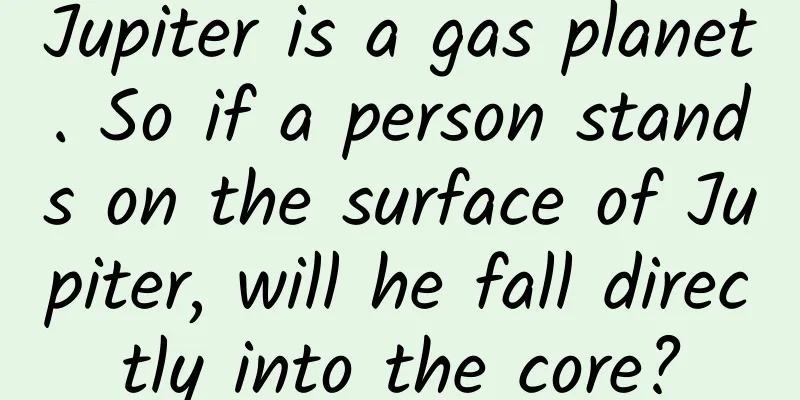Jupiter is a gas planet. So if a person stands on the surface of Jupiter, will he fall directly into the core?

|
Although Jupiter is a gas planet, it does not mean that it does not have a hard core. Its core has a rocky core, which is mainly composed of iron and silicon. The volume of this core is about 2 to 3 times the size of the Earth. Due to its extremely high density, its mass is about 10 to 15 times that of the Earth. With such a core, even if you have a drill that is many times stronger than a diamond drill, you cannot enter its core. How can you fall into the core of Jupiter (not the Earth's core)? So, can it fall to the surface of this wood core? It is also impossible. First of all, the wood core has no clear boundaries. Going outward from the core is a gradual dilution process. The top of the core is composed of mixed particles of rock and hydrogen, which gradually transitions to the liquid metal hydrogen circle, and then to liquid hydrogen. The phase transition pressure of this liquid hydrogen is about 2 million atmospheres, and the phase transition temperature is about 10,000K; at the core boundary the temperature is about 36,000K, and the internal pressure can reach 3,000~4,000GPa, which is 30 to 40 million atmospheres, 10 times greater than the core pressure of the Earth. Above liquid hydrogen is gaseous hydrogen, which gradually transitions to Jupiter's atmosphere. Scientists regard the atmospheric pressure of 1 bar, which is about the depth of 1 atmosphere of the earth, as the surface of Jupiter. The thickness from the top to here is about 5,000 kilometers. The main components of the upper atmosphere are 88-92% hydrogen and about 7-11% helium. The remaining 1% is filled with trace substances such as methane, water vapor, ammonia, silicon compounds, carbon, ethane, hydrogen sulfide, neon, oxygen, phosphine, and sulfur. Jupiter's atmosphere is divided into four layers, namely the troposphere, stratosphere, thermosphere, and exosphere. The temperature of the atmosphere in the topmost exosphere is about 165K (-108℃), and it gradually warms up and cools down as it goes inward. In the thermosphere, the temperature can reach 1000K, and in the stratosphere, the temperature drops to 200K, and in the troposphere, it is 110K; further down, the pressure and temperature are getting higher and higher until the hydrogen phase changes into liquid hydrogen, with a temperature of up to 10000K. Jupiter's atmosphere is turbulent, with the maximum speed of the storm reaching 150 meters per second, while the speed of a level 17 storm on Earth is only about 60 meters per second. Jupiter's Great Red Spot is a huge storm that has existed for hundreds of years. This huge storm can hold three Earths. Because Jupiter's magnetic field is 14 times stronger than that of the Earth, the lightning and thunder caused by it are 10,000 times stronger than that of the Earth, which can tear apart and destroy almost everything. This is part of what humans know about Jupiter's environment. This knowledge is not imagined out of thin air, but is obtained by scientists through decades of scientific modeling based on countless data and images collected after various observations and visits by probes. In such an environment, how can a person stand on Jupiter and fall into the core? We can imagine that if a spaceship sends a person to Jupiter and lets him wear a space suit and go out of the cabin to fall freely into Jupiter, he may experience the following process: If the space suit can withstand the pressure and high temperature, theoretically he can fall to a depth of 5,000 kilometers. But in this process, the acceleration will be faster and faster, and the temperature of friction with Jupiter's atmosphere will be higher and higher. Not to mention humans, even steel cannot withstand it, so in this falling process, it will be dismembered and burned. If any residue from this dismemberment and burning process can reach the troposphere, it will be ravaged again by storms and lightning, and completely integrated into Jupiter's atmosphere. Finally, under increasingly high pressure and temperature, it will be integrated into the liquid hydrogen without leaving a trace. After completing its Jupiter exploration mission beyond expectations, the Galileo probe launched by NASA crashed into the largest planet in the solar system as planned in the early morning of September 22, 2003 Beijing time, ending its eight-year lonely exploration mission with its final brilliant bloom. 1,500 representatives from all walks of life related to Galileo gathered at NASA's Jet Laboratory to bid it farewell. The Galileo probe weighs about 345 kilograms, and its thick heat shield accounts for 200 kilograms. When it falls into Jupiter's atmosphere at a speed of 170,000 kilometers per hour, or 47 kilometers per second, it will be subjected to an acceleration of 400g, 14 atmospheres of pressure on the surface, and the temperature will rapidly rise to 10,000 degrees Celsius. Under this high temperature and high pressure impact, it will be dismembered and burned in a few minutes, disappearing without a trace, becoming trace elements in the dense atmosphere and liquid hydrogen. Do you think a person standing on Jupiter would fall directly into the Earth's core? Welcome to discuss. The original copyright of Space-Time Communication is reserved. Please do not infringe or plagiarize. Thank you for your understanding and support. |
<<: On the Lantern Festival, go to the big ship to look for "rabbit"!
>>: Wonders of the frozen lake - ice bubbles
Recommend
Ant Eight-Handed King Three Courses: Prop Ball, Graphics, and Body
Course Catalog ├──Prop Ball | ├──1..20191026 Prop...
How much does it cost to customize Yichun underwear through the mini program? Yichun underwear applet customization price inquiry
The factors affecting the quotation of Yichun und...
[Inspirational story] Don’t be afraid of falling and never give up
[Inspirational Story] Don't be afraid of falli...
Wireless noise reduction, no need to pick up the phone for conversation, Sony WH-1000XM4 uses intelligence to wake up your ears
Among the numerous headphone products, no one can...
New progress in angiosperm research! Chinese scientists discovered the earliest fossil evidence
Produced by: Science Popularization China Author:...
Example Analysis | How do operators conduct App data analysis?
For an operations staff, doing a good job of data...
Beware! Chronic fatigue syndrome may bring big trouble! Check to see if you are affected →
Have you ever been extremely tired in your life, ...
LG is being criticized for withdrawing from China. What is the problem?
Since the beginning of this year, LG Electronics,...
How much does it cost to develop a Taizhou jewelry mini program? What is the price for developing Taizhou jewelry mini program?
There is no doubt that the topic of mini programs...
A rough and fast Android full-screen adaptation solution
1. Current situation Due to the serious fragmenta...
34-year-old anti-cancer internet celebrity passed away! To extend the survival of lung cancer patients, you can learn about these methods
Recently, the hot search topic #34-year-old anti-...
WeChat Mini Programs are popular. I have summarized the 4 best ways to learn mini programs by yourself in terms of product and operation.
With the public beta release of WeChat Mini Progr...
Let's talk seriously about programmers' self-cultivation
Today, when I was browsing the Blog Park, I saw a...
Why do information flow? Redefine the structure and creative writing of information flow copywriting
When it comes to redefining information flow copy...









